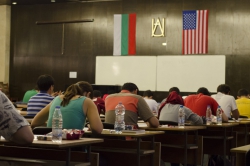The Vojtěch Jarník International Mathematical Competition is the oldest math contest in Europe. This year it took place for the 27th time. Traditionally, the participants from leading European universities come to the Technical University of Ostrava to take part in the competition, which is divided into two categories – the first one is for first- and second-year students and the second one for junior and senior students, 150 participants in each division. They have four hours to solve four tasks. The jury gives up to 10 points for each one.
“A totally right solution gives you the ceiling amount of points. Some slight mistakes lead to penalties. For instance, a participant solves a task partially or offers a solution for a particular case only, but doesn’t solve the task completely. The jury chooses a strategy of evaluating these incomplete solutions in advance,” says Gennady Korotkevich, who participated in the second category.

The Vojtěch Jarník International Mathematical Competition Credit: social networks
Mr. Korotkevich gained 20 points for the solutions of two tasks, and 14 for incomplete solutions of others. The participant who placed 1st gained two points more than Gennady Korotkevich. Dmitry Krachun from St. Petersburg State University received as many points as Mr. Korotkevich and also placed 2nd. The results of the competition are published here.
Usually, math contests include problems that have no typical solutions, and participants have to look for extraordinary ones using their ingenuity. There is a plenty of strategies for solving them. ITMO.NEWS talked to the participants of the Vojtěch Jarník International Mathematical Competition who shared about how to manage the time during such contests and what kinds of problems have to be solved primarily.
Dmitry Yakutov: “Sometimes it is better to solve those problems that you like more.”
“There are two types of math competitions: the first type includes ones that have one round (or several rounds conducted at different days) and consist of up to five problems. According to the rules of such competitions, the problems are given in increasing order of difficulty. So it is rationally to follow this order. However, each participant has his or her favorite types of problems. For instance, I like to solve linear algebra and number theory problems. One can neglect the order if one sees a favorite task, but at the same time, I recommend to keep the balance: it doesn’t work when you start solving the last problem from the list of the favourite ones having ignored the first problem. The Vojtěch Jarník Competition refers to the first type – it has one round and four hours for solving four tasks. The second type on contests includes those that have many tasks – over ten ones. Usually, first two-three problems are simple while others are of the same difficulty level. When taking part in these competitions, one has to solve the problems one likes more. I am going to continue taking part in math competitions – they give an opportunity to meet with representatives of companies offering sponsorship and get acquainted with the peculiarities of mathematical cultures of different countries,” says Mr. Yakutov.

The Vojtěch Jarník International Mathematical Competition Credit: social networks
Alexey Latyshev: “Don’t forget writing down your solutions.”
“I think that it is important to read all the problems before solving. Sometimes one knows how to solve even a difficult one from the very beginning. One also needs some time for writing down the solutions. To understand how to manage your time you need experience – there is no plan that is appropriate for everyone. The tasks given at the Vojtěch Jarník Competition are usually very difficult – it is a good result to solve even one. However, this year the problems were easier than usual,” says Mr. Latyshev.
Gennady Korotkevich: “I ponder on all the problems before I start solving.”
“There are lots of ways for managing one’s time – it is process different for every man. I usually start with thinking about potential solutions of all the tasks by moving from the first to the last one. When you come back to a problem after some break, you find out new ideas. It works well for the problems given at competitions, because you never know which solution is the best. I know that some people don’t like thinking about several problems at the same time – they spend some time for each problem and never return to it. There are also basic principles of tactics. For example, if you have several tasks that give the same amount of points, solve the easiest one before the others. Math problems are not only about solving tasks, but also about writing down your solutions. Don’t leave this until the last minute – a risk for you to lack the time to do that,” comments Gennady Korotkevich.





